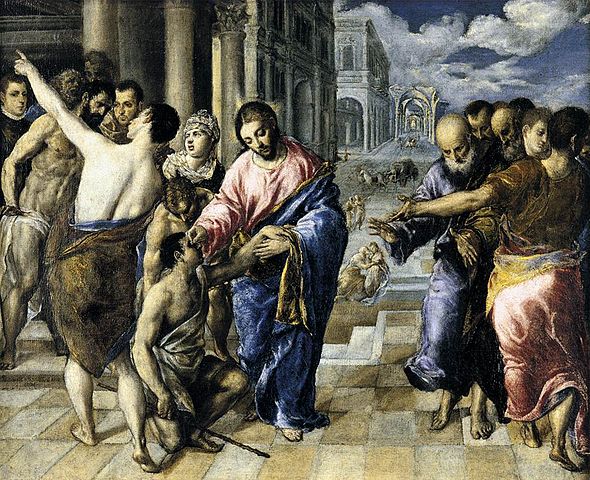The blind man of Bethsaida
Blind Man healed gradually.
(The Gospel History, Section 70)
And they come unto Bethsaida. And they bring to him a blind man, and beseech him to touch him. And he took hold of the blind man by the hand, and brought him out of the village; and when he had spit on his eyes, and laid his hands upon him, he asked him, Seest thou aught? And he looked up, and said, I see men; for I behold them as trees, walking. Then again he laid his hands upon his eyes; and he looked stedfastly, and was restored, and saw all things clearly. And he sent him away to his home, saying, Do not even enter into the village.

The blind man of Bethsaida
(The Saviour of the World, Vol IV, Book III, Poem XLV)
Christ and His following came to Bethsaida:
A man was there pitied of all the folk,
For he was blind; they led him to the Lord,—
Beseeching, Christ would give this blind man sight,
Make him as other men who go and come,
Joy in the sunshine, see the face of friend.
Ah, happy blind man! Jesus took his hand
And led him,—He, the Lord,—without the town,
Apart from all the folk: we are not told
Of beatitude that fell on that blind man,
His fingers held by Jesus: did he know
Of enveloping darkness more, or wish to see?
Christ spat and laid His hand on the poor eyes
All seared and painful: “Seest thou aught?” He said;
The man looked up; “Nay, surely, I see men!
As walking trees they’re moving to and fro,
Ah, blessedness, to see men come and go!”
Again, the Master laid His tender hands;
Coolness and healing brought they; “Now, look up.”
Steadfast he looked; to see mere bulk astir
Had gladdened the poor soul; but now, he saw;
The gracious lineaments of men were plain,
The little children danced, the women gazed,
Pitiful, glad, at him restored to sight;
The sun shone down upon them; trees were green:
The happy blind man saw, and saw aright!
The Lord gave sign which whoso will may read:
Behold, three stages in man’s pilgrimage
Which every traveller treads:—first, we go dark,
And any leads who chooses to take hand;
Blind guides we follow tamely nor take heart
To ask, Where leads it, then, this path we tread?
Pitfalls full many lie in our way; sudden, see,
We sink, and find us bruised and hurt, we’ve fallen
In loathsome mire: then out once more we get,—
Scrambling, unseemly, all with mud encrust;—
Comes straight another ditch and in we fall!
One day, a Voice falls on our ear, a Hand
Whose touch is healing takes this hand of ours
And leads us on: a touch upon our eyes,
A softening touch as of tears and tenderness,—
We look up,—lo, we see! Alas, too long
Have sealed eyes blinded us to brother-men;
The world shut out, our sole concern, those things
That grieved, made glad, or fed, or sheltered us,—
Why, what were men to us? They passed us by;
Perceived we them in passing—solid things,
Which shut out the sun, obscured the light, what more?
But men like us, who gladness felt, annoy,
In sorrow heavy, or elate with joy,
Men whose concerns were nearer than our own,—
Nay, could we guess it when our eyes were dim?
Again, we know that Hand upon our eyes;
Is’t doubt, or loss, or loneliness that lies
Athwart our failing vision? Sight is none,
Blackness of darkness gathers round our way,
The darker that we saw, if all amiss:
And, lo, the Hand, whose gentleness had touched
Our indurate heart, removes; again, we see;
And all men stand revealed: our Brothers go
Hasting in eager quest that way and this:
And we, solicitous, watch in dismay
Or glad congratulation; haste to help,
If but with fellowship of eye, the man,
Who endeavours for his kind: that other,—“Hold,
My Brother, see you, danger lies that way;
A foul infection’s in the air; turn thou,
And walk where men go safe!”
First, dark, we go,
In midnight blackness shrouded, nor see aught
But seek in the dark supplies for petty needs:
Then, vision comes, but dim; the men we see,
What wot we of their purpose? What to us,
The joys or pains another’s breast disturb?
But there’s a further stage; our eyes are ope’d,
And all men go, our Brothers! All that hurts,
And all that relieves poor men, ’tis ours to feel.
Enable us, Lord, that seeing, we go forth,
And, all the men we pass, for Brothers know!
St. Mark viii. 22-26.